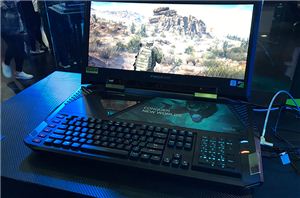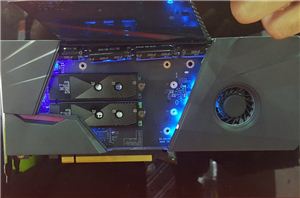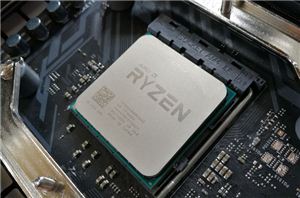More 2TB PCIe 4.0 SSD Options: Patriot with Custom Firmware coming Q4
by Ian Cutress on June 6, 2019 4:00 PM EST- Posted in
- SSDs
- Patriot
- Trade Shows
- Phison
- PCIe 4.0
- Computex 2019
- PS5016-E16

If you’ve been following our coverage of Computex, you may have seen that there have been several companies with PCIe 4.0 SSDs to show off. These designs have almost exclusively been based on the new Phison E16 controller, with a variety of intended NAND. Most of these designs rely on Phison’s pre-made ‘turn-key’ solution, which allow vendors a quick time to market, but little to differentiate the models. Patriot is going in a different direction.
Patriot is still keeping the base layout of the E16 design, with capacities from 500GB to 2TB, along with whichever NAND flash they think is best to use. It will also be paired by an appropriate cooling system. What Patriot will bring to the table is that it will spend some time tweaking Phison’s firmware to find a better balance between performance, power consumption, and endurance.
Patriot told us that they’re a close partner with Phison, and that they want to provide some additional value to the customer beyond just the standard solution that Phison provides. As a result, Patriot will be later to market than the two companies expected to launch first (Corsair, GIGABYTE), and hopefully will have better specifications as a result. It will be interesting to see if any of these optimizations can be carried over to Phison’s next generation drive for PCIe 4.0 SSDs next year, which is likely going to remove the current 4.8 GB/s limit of the controller.
As and when Patriot releases the drives to the market, we have requested samples for testing to see the effect of these firmware tweaks.
| Want to keep up to date with all of our Computex 2019 Coverage? | ||||||
 Laptops |
 Hardware |
 Chips |
||||
| Follow AnandTech's breaking news here! | ||||||















6 Comments
View All Comments
leexgx - Thursday, June 6, 2019 - link
its really to bad U2 never taken off as heat would of Not been an issueDrazick - Friday, June 7, 2019 - link
Totally agree with you.Mother Board shouldn't be used for storage in desktop systems.
PixyMisa - Friday, June 7, 2019 - link
I'd like to see USB-C replace SATA. Power and data over a single cable, speeds up to 20Gbps with USB 3.2, and any internal drive works externally without an adaptor.TheUnhandledException - Monday, June 10, 2019 - link
20 Gbps is way too slow for NVME. Current PCIe 3x4 interface is 32 Gbps and is quickly becoming the bottleneck. PCIe 4x4 bumps it to 64 Gbps. That is before you consider the rather significant overhead that usb adds. You don't get drives capable of more than 75% of the raw throughput with usb.FXi - Friday, June 7, 2019 - link
Don't think Intel is going to bring 4.0 to the consumer chipsets until 2020 at the earliest. So from both a cpu and storage performance angle Ryzen has a year to rule the roost, maybe longer.